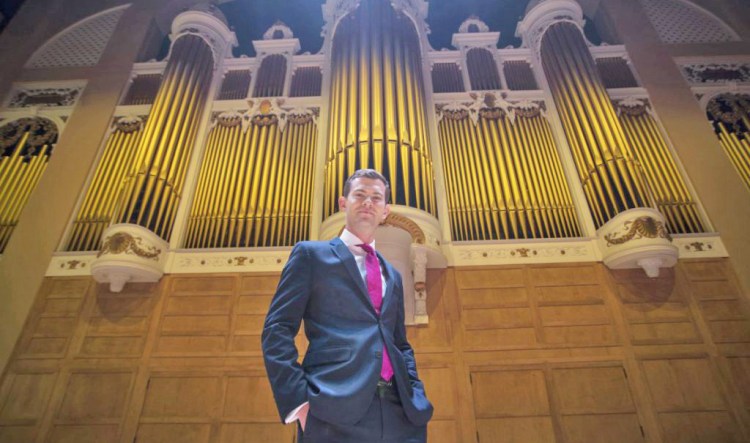Like anyone taking over a new post, James Kennerley, Portland’s new municipal organist, would like to revitalize the position and make listeners as excited about the Kotzschmar organ as he is. And judging by the attendance and response to his debut recital on Wednesday evening – Merrill Auditorium was as full as I’ve seen it for an organ concert, and there were whoops of joy after several pieces – he is off to a strong start.
Kennerley, a 33-year-old Englishman with a striking resumé that includes studies at Cambridge University and the Juilliard School, and organist and choirmaster positions in London and New York, is the 11th musician to hold the job since it was established in 1912. He is young, dapper, energetic and enthusiastic (in an introductory video, he said that his recital would be a hint of what he plans to do in the job for the next three or four decades), and not incidentally, a bold, imaginative interpreter of a broad range of music, a healthy sampling of which he played at his recital, which was presented by Friends of the Kotzschmar Organ.
He called his program “Overtures,” a fitting title for the start of a new job, but also a reference to the fact that four of the seven pieces he played (eight with the encore) were overtures: three from operas (Rossini’s “William Tell,” Wagner’s “Die Meistersinger von Nürnberg” and Bernstein’s “Candide”), the fourth a lightweight but amusing concert overture by the British composer-organist Alfred Hollins.
The opera overtures, apart from being familiar and audience-friendly, gave Kennerley an opportunity to show what he, and the Kotzschmar organ, with its myriad effects-stops, can do. Actually, his transcription of the Rossini was fairly restrained, in the sense that his choice of colors kept close to those of the orchestral score, with its prominent brass figures, flute, reeds and strings – although he did use a wind effect to enhance the storm section – and though one could quibble over balances here and there, he did a spectacular job of pulling a vivid orchestral texture into the organ’s realm.
The same could be said of his performance of the Wagner, in his own updated version of a transcription by Edwin Lemare, Portland’s third municipal organist (from 1921 to 1923). Lemare, who, like Kennerley, was born in England, produced a straightforward transcription that maintained the overture’s grandeur and hewed close to the orchestral coloration, but did not embrace all the percussion sounds the Kotzschmar can persuasively produce. Kennerley added those, among other tweaks, but as in the Rossini, his reading of the work drew its excitement from its sheer musicality, not from its potential for effects or gimmickry.
Not that Kennerley was unwilling to draw on such things when they could enliven the proceedings. There was, for example, another Lemare piece, the Andantino in D flat major, a piece with such an attractive, lilting melody that in 1921 – 33 years after Lemare composed it – the songwriters Ben Black and Charles N. Daniels affixed lyrics to it and made it a hit as “Moonlight and Roses.” Before playing the andantino, Kennerley sang a verse of the song, holding the microphone in his right hand and playing a light chordal accompaniment with his left.
Joining the Lemare and Hollins among the non-overtures on the program were Franck’s Chorale No. 2 in B minor, a serious, rich-textured meditation that let Kennerley show off the Kotzschmar’s twin Vox Humana stop, which evokes the human voice, and Jonathan Dove’s “The Dancing Pipes” (2014), which embraces both minimalist repeated figuration and more intense chromaticism that at times sounds almost electronic.
Kennerley was at his most freewheeling at the end of the concert, when he outfitted Bernstein’s zesty “Candide” overture with bird calls, bells, antique car horns and other effects, and in a virtuosic encore, an arrangement of the Brazilian chôros “Tico Tico no Fubá,” which he kitted out, not only with an array of outlandish timbres, but also a handful of interpolated themes, ranging from Beethoven’s “Für Elise,” to a nod to James Bond.
It looks like his tenure here will be enlightening, but also fun.
Allan Kozinn is a former music critic and culture writer for The New York Times who lives in Portland. He can be contacted at:
allankozinn@gmail.com
Twitter: kozinn
Send questions/comments to the editors.

